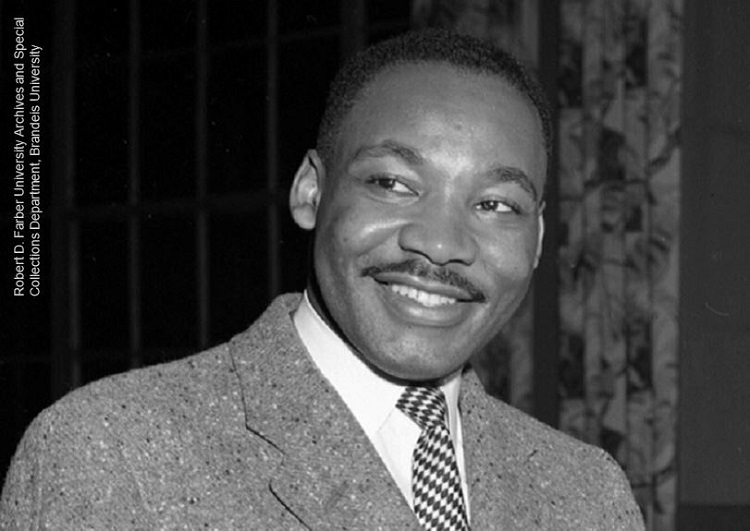University Libraries

Justice Without Violence
By Diane Osman
Since 1986, on the third Monday in the month of January, we honor the life and legacy of Martin Luther King Jr., a social activist and Baptist minister who played a key role in the American civil rights movement. Through his philosophy of nonviolent resistance, King led the fight for all victims of injustice and economic disadvantage in the United States. He was the energy and inspiration behind key events in the Civil Rights Movement during the late 1950s and ’60s such as the Montgomery, Alabama, bus boycott in 1956 and the 1963 March on Washington, which helped bring about groundbreaking reform in the Civil Rights Act of 1964 and the Voting Rights Act of 1965.
The King Center, founded in Atlanta in 1968 by King’s widow, Coretta Scott King, set the theme for this year’s celebration of King’s memory: “Shifting the Cultural Climate Through the Study and Practice of Kingian Nonviolence.”
“As we witness nations around the world continue to struggle under the weight of violence, hate and poverty,” the center said, “today’s social, political and economic landscape reveals the urgent necessity of Dr. King’s philosophy and methodology of Nonviolence.”
In a lecture “Justice Without Violence” at Brandeis University in 1957, King promoted an alternative to violence: “We may think of this alternative as a method of nonviolent resistance, for you see it as possible to achieve justice through nonviolence. This method has been made famous in our generation by the work of Mahatma Gandhi, who lived in India not many years ago, and who used this method to free his people from the political domination, the economic exploitation and humiliation inflicted upon them by Britain. He, I imagine, proved more than anybody else in the modern world that this can be an effective method in seeking justice, in seeking to break loose from oppression.”
King first learned of Gandhi's approach of nonviolence in seminary.
“I came to see for the first time that the Christian doctrine of love operating through the Gandhian method of nonviolence was one of the most potent weapons available to oppressed people in their struggle for freedom,” he wrote in The Christian Century in April 1960.
Inspired by Gandhi's philosophy, King developed six guiding principles of nonviolence on his path toward achieving justice and human rights for Black Americans:
- Nonviolence is a way of life for courageous people.
- Nonviolence seeks to win friendships and understanding.
- Nonviolence seeks to defeat injustice or evil, not people.
- Nonviolence holds that unearned, voluntary suffering for a just cause can educate and transform people and societies.
- Nonviolence chooses love instead of hate.
- Nonviolence believes that the universe is on the side of justice.
Honoring King on Campus
To honor Martin Luther King Jr. on Jan. 15, the University of Dayton Libraries suggests:
- Visit the University of Dayton Libraries for resources to learn more about Dr. Martin Luther King’s life and legacy and the Civil Rights Movement. Here are a few recommendations:
- The Autobiography of Martin Luther King, Jr., by Clayborne Carson
- Parting the Waters: America in the King Years, 1954-63, by Taylor Branch
- The Heavens Might Crack: The Death and Legacy of Martin Luther King, Jr., by Jason Sokol
- Bearing the Cross: Martin Luther King, Jr., and the Southern Christian Leadership Conference, by David J. Garrow
- Participate in the University of Dayton’s Martin Luther King Jr. Celebration Events
- Volunteer in your community to promote positive social change.
During a sermon at the Dexter Avenue Baptist Church in Montgomery, Alabama, in 1957, King stated, “Darkness cannot drive out darkness; only light can do that. Hate cannot drive out hate; only love can do that.” This proclamation of strength and faith was the cornerstone of Dr. Martin Luther King, Jr.’s social justice legacy.
Further Reading
- Martin Luther King Jr. Day Of Service
- Martin Luther King Jr.’s “Justice without Violence” lecture at Brandeis University
- When Martin Luther King Jr. Visited Brandeis
- How Martin Luther King Jr. Took Inspiration from Gandhi on Nonviolence
- The King Philosophy: Nonviolence365
- MLK’s Six Principles
— Diane Osman is a member of the Libraries diversity and inclusion team. Photo is used with the permission of the Robert D. Farber University Archives & Special Collections Department, Brandeis University.
